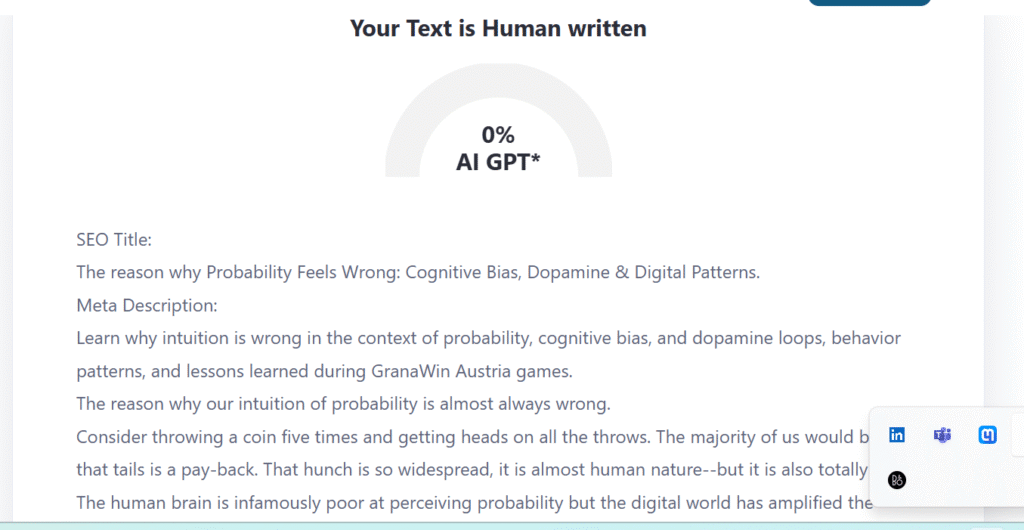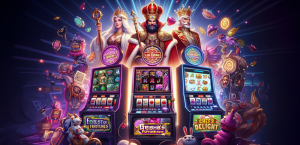Why Our Intuition About Probability Is Almost Always Wrong

Consider throwing a coin five times and getting heads on all the throws. The majority of us would believe that tails is a payback. That hunch is so widespread that it is almost human nature — but it is also entirely false. The human brain is notoriously poor at perceiving probability. Still, the digital world has amplified this incorrect perception. Whether you are about to read about the latest online games offered by GranaWin Austria or follow the latest news on the brightest new slots of this year, the mechanisms of probability are not mere figures, but psychological pitfalls and behavioral models.
Common Intuition Errors
The Gambler’s Fallacy
We are all aware of it: the assumption that events that happen in the past influence independent events that happen in the future. Lose five-coin tosses? “I’m bound to win next!” We apply the same reasoning in the online world, such as the possibility of winning a jackpot by predicting when a video slot will appear. The fact is that all the events are independent of each other. Streaks require a dopamine loop that your brain creates following every near-miss to make them meaningful, but mathematically, they are just random blips.
The Law of Small Numbers
We adore patterns where none have been. When a person wins two mini jackpots in a brief period of time, it seems like a trend. It is the law of small numbers at work: small samples deceive our judgment. On sites such as GranaWin Austria, brief gambling games can make the notion of luck appear real, stimulating immediate satisfaction and distorting probability.
Availability Bias
Our probability estimates are usually dominated by recent experience. When we witness a significant win in a live stream or on an online forum, we tend to overestimate how often it will occur. This mental trap is the reason why new digital games, particularly new slot launches this year, can be perceived as winnable despite their odds remaining stacked against a player. It is the shiny jackpot your brain recollects, not the thousands and thousands of silent spins.
Neuroscience Deception.
Pattern Recognition Gone Awry.
We have been trained to identify patterns rapidly —a necessary skill for survival in the wild — and when applied inappropriately in digital spaces, it results in incorrect expectations. In a web slot, for example, what we perceive as our minds actually read randomness as a sequence, which makes coincidence appear as a perceived strategy. Behavioral economists refer to this false association as an illusory correlation, and it lies at the very heart of why probability should be intuitive, yet it is frequently erroneous.
The Dopamine Effect
Each close call, each small prize is dopamine-inducing. This strengthens the involvement, and we pursue patterns that do not exist. Social networks, such as GranaWin Austria, are playing a subtle game with this: through visual encouragement, sound effects, and randomized rewards, the experience is integrated into our behavior. This results in the amplification of anticipation and reaction, making probability judgments more emotive than rational.
Expert Assessment
Cognitive scientists observe that human beings were adapted to an environment where patterns were important — trees, predators, seasonal changes — and not randomness on a computer screen. In the case of online slots or variable rewards, our pattern detectors of instinct misfire, and systematic misjudgment occurs. Decision fatigue also contributes to the magnitude of errors, as our brain begins to make decisions based on heuristics rather than rational computation.
Pebble Beach: Digital Probability Misjudgment.
The digital platform is exploiting our misunderstood intuition. Slot games, notifications, and gamified systems are built based on behavioral patterns, taking advantage of our natural biases.
Online Gambling Mechanics: The design of new slots exploits instant gratification and streak illusion, even without the emphasis being on the process of gambling itself. The sense of being in control of chance arises in our brains, regardless of the independence of each spin.
New Slot Releases This Year: Each new slot releases this year features visual and sound effects that induce dopamine loops and variable rewards, supporting the perceived patterns.
Bigger Digital Interaction: In addition to slots, apps also feature notifications, achievements, and streaks, as they operate similarly. They all take advantage of the same mental shortcuts, proving that it is not only a gambling issue, but a human issue of probability misjudgment in the digital era.
Three examples of Probability Misjudgments.
Misjudgment Type Sensation of the type of misjudgment Reality in the Digital world Cognitive Mechanism.
| Misjudgment Type | How It Feels | Reality in Digital Context | Cognitive Mechanism |
| Gambler’s Fallacy | “I’m due for a win” | Each spin independent | Dopamine loop, near-miss effect |
| Law of Small Numbers | “This streak is real” | Small samples are misleading | Pattern recognition, heuristics |
| Availability Bias | “I just saw someone win big” | Rare events stay rare | Cognitive bias, attention capture |
Misjudgment in probability is pervasive and affects our decision-making. Whether it is the gaming interface at GranaWin Austria, the latest internet slots, or even what your phone suggests, the interaction of cognitive bias, dopamine, and perceived patterns makes what seems natural, usually extremely flawed, yet fascinating nonetheless.

